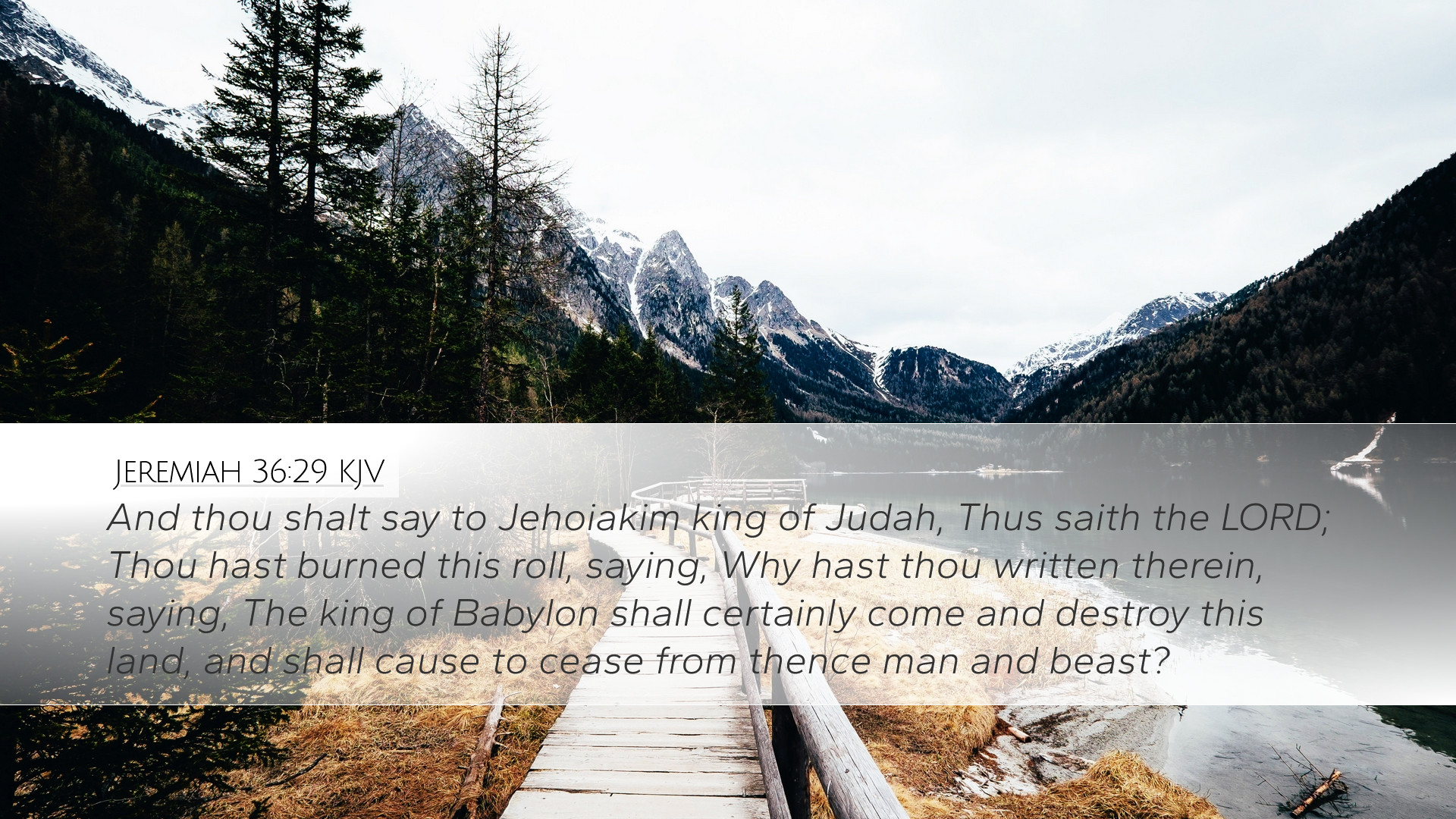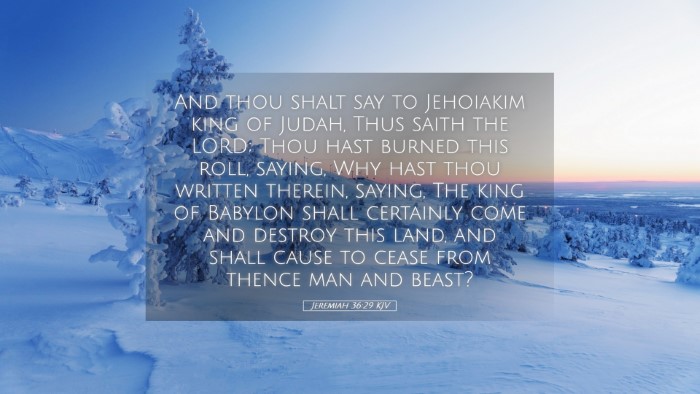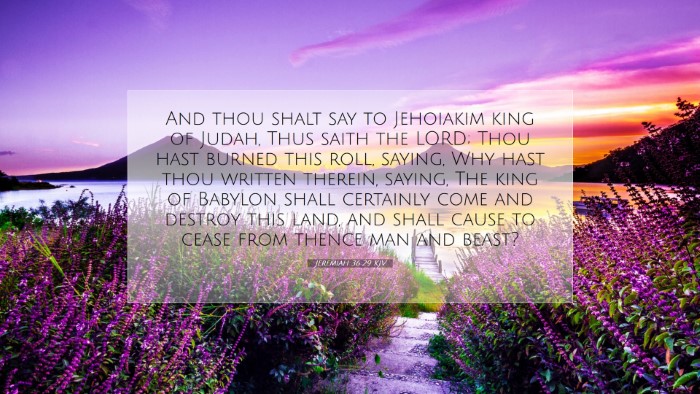Bible Commentary on Jeremiah 36:29
Bible Verse: "And concerning Jehoiakim king of Judah thou shalt say, Thus saith the Lord; Thou hast burned this roll, saying, Why hast thou wrote therein, saying, The king of Babylon shall certainly come and destroy this land, and shall cause to cease from thence man and beast?" (Jeremiah 36:29)
Introduction
The passage from Jeremiah 36:29 provides a critical look at the interaction between divine prophecy and human rebellion. It speaks to the specific act of King Jehoiakim of Judah burning the scroll that contained the prophecies of doom regarding Jerusalem and its eventual fate concerning the Babylonian conquest.
Historical Context
The historical backdrop is essential in grasping the gravity of Jeremiah’s message. At the time, Jehoiakim was a king who had turned away from God, opting instead for alliances that would ultimately lead to his downfall. This context is insightful when we consider the implications of Jehoiakim’s actions in burning the scroll.
Matthew Henry's Analysis
Matthew Henry emphasizes the significance of God's word in the life of the nation. He notes that the scroll represented not just the prophecy but also God’s covenant with His people. By rejecting these words, Jehoiakim simultaneously rejected God’s authority and His impending judgment.
According to Henry, Jehoiakim's act of burning the scroll is emblematic of a broader disregard for divine revelation. Henry often points out that such defiance does not negate the prophetic truths; rather, it highlights the desperation of a leadership that refuses to repent. The scroll served as a reminder of God's impending judgment, and its destruction did not alter the reality of the situation nor the authenticity of the prophecy itself.
Albert Barnes' Commentary
Albert Barnes provides clarity on the phrase "the king of Babylon shall certainly come." He explains that this assertion underscores God's sovereignty over nations and history. Barnes perceives Jehoiakim as a tragic figure, whose refusal to heed the warnings of impending doom ultimately led to the destruction he sought to avoid.
Barnes also emphasizes that the burning of the scroll is significant in that it illustrates a futile attempt to erase God’s decrees. He draws parallels between Jehoiakim and modern societal trends where people attempt to ignore or distort divine truth to align better with personal desires or political agendas.
Adam Clarke's Insights
Adam Clarke, in his extensive analysis, provides deep reflections on the consequences of burning the scroll. He highlights that Jehoiakim’s actions reveal not merely personal defiance but a national spiritual crisis. Clarke suggests that the act displays the king’s misguided belief that he could alter his fate through censorship of God's words.
Clarke also notes the theological implications of such defiance, pointing out that it serves as a reminder of the limitations of human authority against divine intention. He stresses that the burning of the scroll did not mute God’s voice; instead, it demanded a more profound consequence, as God’s judgment was affirmed unchangingly.
Theological Reflection
This passage is not only historical but also bears rich theological insights. The acts of Jehoiakim serve as a vivid illustration of human tendencies to resist the truth of God. From a theological perspective, the attempt to erase God’s word is a consistent theme throughout scripture—a reflection of humanity's struggle with sin and the desire for autonomy.
- Human Rebellion: The narrative reflects a common human reaction to divine confrontation—rebellion. This rebellion can manifest in various forms, from outright defiance to neglect and apathy towards God's instructions.
- The Inevitability of Prophecy: The unwavering truth of God’s prophecy serves as a reminder to believers and leaders alike that divine truths cannot be overridden by human actions.
- The Call to Repentance: Jeremiah’s scroll was a call to the nation for repentance. Consequently, the passage invites self-examination for both individuals and communities regarding their stance towards divine commandments.
Application for Today
For pastors, theologians, and students of the Bible, the lessons from Jeremiah 36:29 remain as relevant today as they were during the time of Jeremiah. The scripture challenges leaders to align themselves with God's will and not seek to burn or ignore inconvenient truths for personal gain or political expedience.
- Vigilance Against Complacency: The passage serves as a warning against complacency in faith life and encourages ongoing engagement with God’s word.
- Integrity and Courage in Leadership: Leaders in the church and in society must cultivate the integrity and courage to face uncomfortable truths rather than dismiss them.
- Understanding of God’s Sovereignty: A robust understanding of God’s sovereignty can provide comfort and clarity in turbulent times, encouraging faithfulness whether faced with adversity or ease.
Conclusion
Jeremiah 36:29 presents a gripping portrayal of the relationship between God and humanity, showcasing the profound consequences of rejecting divine truth. The insights from Matthew Henry, Albert Barnes, and Adam Clarke highlight the multi-dimensional aspects of this relationship and invite readers to deeply consider their own responses to God’s revelations.
Ultimately, this passage is not just historical but serves as a continual reminder of the necessity for responsiveness to God’s word, the importance of prophetic voices, and the weight of leadership that fears neither man nor circumstance but respects God above all.


